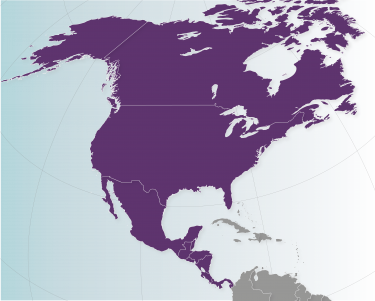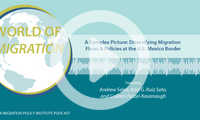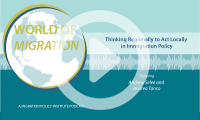 Migration profoundly shapes and defines the U.S. relationship with Mexico and, increasingly, much of Central America. And as humanitarian, economic, climate, and other persistent pressures and pull factors are leading to more diverse and occasionally chaotic flows, countries in the region from Canada to Panama increasingly recognize the need for a coordinated regional approach to migration management—both to promote legal, orderly, and safe migration but also to leverage its value for countries of origin and destination alike.
Migration profoundly shapes and defines the U.S. relationship with Mexico and, increasingly, much of Central America. And as humanitarian, economic, climate, and other persistent pressures and pull factors are leading to more diverse and occasionally chaotic flows, countries in the region from Canada to Panama increasingly recognize the need for a coordinated regional approach to migration management—both to promote legal, orderly, and safe migration but also to leverage its value for countries of origin and destination alike.
Getting migration and the issues that fuel and surround it right is vital to the region’s long-term stability, prosperity, and its competitiveness in a fast-changing global economy.
MPI’s Building a Regional Migration System project is examining the changing landscape of migration trends and policies in the region from Canada to Panama. The work collected here aims to develop actionable ideas, suggest implementation strategies, inform stakeholders inside and outside of government, and foster dialogue across issues, sectors, and countries on shared regional priorities.
This work presents a new approach to managing regional migration that is centered around four pillars:
- effective humanitarian protection systems,
- targeted legal migration pathways,
- professionalized migration management, and
- informed investments in development and governance in countries of origin, transit, and reception.
The Regional Migration Study Group
MPI’s present-day work on regional migration builds upon the foundation set by its Regional Migration Study Group (2010-2015), which focused on migration and human-capital issues relevant to the United States, Mexico, Guatemala, El Salvador, and Honduras.
During its first three-year phase, MPI and the Woodrow Wilson Center’s Latin America Program/Mexico Institute convened a high-level study group that over 29 publications, biannual meetings, and briefings with regional policymakers sketched the ongoing trends, challenges, and opportunities on migration and human capital facing the region.
The Study Group was co-chaired by former Mexican President Ernesto Zedillo, former U.S. Secretary of Commerce Carlos Gutierrez, and former Guatemalan Vice President and Foreign Minister Eduardo Stein. Its members included two dozen former government officials, civil-society leaders, and policy intellectuals from countries in the region.
The first phase of the Study Group's work culminated in a final report that outlines the powerful demographic, economic, and social forces reshaping Mexico and much of Central America and changing longstanding migration dynamics with the United States. With 14 findings and recommendations for policymakers in the region, the report offers a forward-looking, pragmatic agenda, focusing on new collaborative approaches on migration and human-capital development to strengthen competitiveness.
A second phase (2014-2015) led by MPI promoted the Study Group’s recommendations with policymakers, the business sector, and others in the region, and worked on further projects to develop and certify human capital.
Learn more about the Study Group’s mission here.




























A Post-Title 42 Vision for Migration Management Comes into Focus